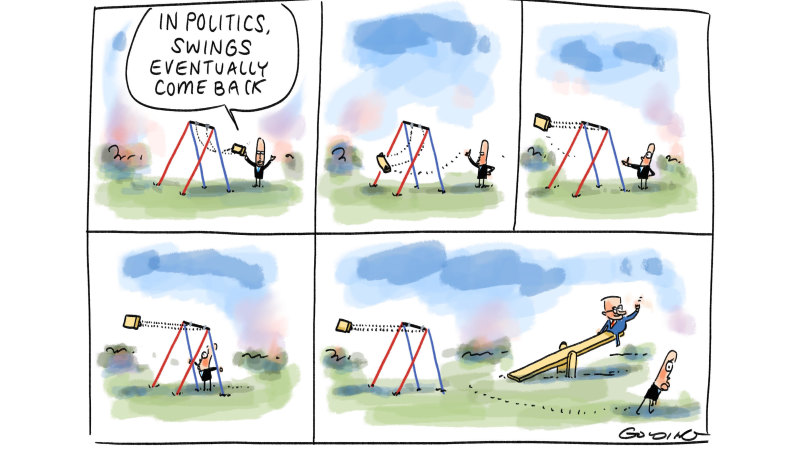
Who is the Labor Party’s real opposition now?
April 11, 2023Credit:Illustration: Matt Golding
To submit a letter to The Age, email [email protected]. Please include your home address and telephone number. No attachments, please include your letter in the body of the email. See here for our rules and tips on getting your letter published.
POLITICS: Who is the Labor Party’s real opposition now?
Nick Bryant is flattering Peter Dutton with his claim that Mr Dutton is making the Liberal Party look like the natural opposition (“Dutton needs to read the room”, 4/4). With his “noalition” tactic of refusing to engage with any major issue he is leaving the opposition role to the Greens.
Adam Bandt is filling this role with capability and grace, leaving Peter Dutton marching the Liberals, with their ageing, withering support base, right down the road to political irrelevance.
Chris Young, Surrey Hills
Be part of the conversation
Companies such as BHP and Orica have welcomed the government’s safeguards mechanism (“Top industrial players back climate policy”, 4/4). They recognise the need to reduce emissions and more importantly for them to have a regulated framework that will aid their long-term planning. Peter Dutton’s opposition could have shared in the success of the safeguards mechanism, after all it was their plan originally, but they have chosen irrelevance by again opposing the government.
Support for the mechanism would have shown Australia’s voters that they want to participate in the challenges ahead, but their relentless negativity will achieve nothing and just alienate voters.
Ross Hudson, Mount Martha
In effect, a centre-left coalition
Could it be that at long last Australia’s national two-party political landscape is taking a centre-left turn? Both David Crowe’s piece “Greens thrive following dust-up” (31/3) and Peter Hartcher’s “Desolate party needs more than renovation” (3/4), accentuate the Liberal Party’s floundering and increasing irrelevance as a significant political force in the federal political landscape.
Even without proportional representation in the House of Representatives – which would give the Greens 18 seats instead of their current four – the Albanese majority Labor government continues to negotiate policy and legislative initiatives with the Greens.
We are increasingly seeing the positivity of a progressive pseudo centre-left coalition in Australia.
Henk van Leeuwen, Elwood
Responding to the community
Is there a more cringe-worthy and specious term than “the aspirational class” that Tony Barry (“Libs must learn lessons from Aston”, 4/4) identifies as being the group that the Liberal Party must focus on?
Who fits into the non-aspirational class? We are all aspirational, we all desire a better life, but socio-economic circumstances are different and can cruel some from achieving their aspirations while being a springboard for others.
The Liberals continue to ignore these differing circumstances and respond with tin ears.
Paul Miller, Box Hill South
Only change can repair the Liberals
Tony Barry has absolutely nailed it. All the factors responsible for the Liberal demise are plainly set out for all to see. The neoliberal policies of the past two decades – taxation, home ownership, lack of support of young voters, marginalisation of women and cultural groups – have come home to roost.
Peter Dutton has had ample time to address the problem, but his answer is “business as usual”.
John Marks, Werribee
Funding tax cuts
Is Tony Barry suggesting the Liberal Party increase taxation on assets and investments to fund income tax cuts for aspirational voters?
If so its list would have to include abolishing negative gearing, franking credits, tax discounts to capital gains and superannuation contributions, and for good measure introduce a mineral resources tax. Um … pigs might fly!
Peter Heffernan, Balaclava
THE FORUM
Users not at fault
Adele Ferguson “Medicare review blows apart the AMA’s ‘nothing to see here’ argument” (The Age, 4/4) misses a vital twist. Medicare is its own failure. Thirty years of experience working as a medical practitioner and observing fraud and deception with disinterest from Medicare is the root cause of Medicare failure. The secrecy and lack of adaptability of the organisation is not the fault of users.
Dr Dennis Gration, Kallista
Who to trust?
Health economist Dr Pradeep Philip says we need to build trust in Medicare (“Medicare ’wasting $3b, no longer fit for purpose‴, April 4). However, the problems within Medicare suggest there is already too much trust in the health system. The lack of checks and controls show that the system is based on an assumption that health professionals will act honestly and ethically.
Philip’s report, and the earlier work of Margaret Faux, show that is a faulty assumption. Trust might have been justified when Medicare was established, but it is not now.
Health Minister Mark Butler should ignore the confected outrage of bodies such as the AMA and the RACGP and stop making overly sanguine statements about how we can trust health professionals. They have destroyed that trust.
Rod Wise, Surrey Hills
Lack of action
The Age is tackling the issue of urban transformation (“Calls for new CBD as city bursting at the seams”, 3/3). I must thank you. Unfortunately the response from the Victorian government is far too muted and, frankly, disappointing. The deputy premier is quoted as saying it is “premature” to address the form and nature of new urban centres.
We are already seeing higher density development across the middle suburbs but it is of a nature that threatens any future planning for liveable urban centres. Government is leaving the job to developers, whose perspectives are quite understandably on single site development, not on cohesive development.
The urban centres need to be actively project managed. As your planning expert says, the government’s approach is far too laissez-faire.
This delegation of responsibility will result in urban centres with no homes for essential workers and their families and no liveability. It also means the urban sprawl will continue.
Bernie O’Kane, Heidelberg
Second choice obvious
Werribee is the obvious choice for a second CBD (“The sprawling suburb that is Melbourne’s greatest hope”, 4/4). A massive state government swath of land in Werribee that was planned as an education, technology and employment precinct was cancelled in 2019 without explanation.
Werribee is gazetted as a growth corridor with the population expected to increase by 40 per cent to more than 400,000 by 2040. Werribee desperately needs employment opportunities to be commensurate with population growth.
We have everything else: vacant land, being ideally placed between Melbourne and Geelong, Avalon Airport nearby, a river, a harbour, beaches and many tourist destinations such as the Mansion, the open plan zoo, State Rose Garden and two aircraft museums.
Our local member is the state treasurer. What could possibly go wrong?
John Marks, Werribee
Signing up is our call
Rod Lyons from ASPI asserts that Australia signing the UN Treaty on the Prohibition of Nuclear Weapons “could throw the US-Australia Alliance into doubt” (“Labor weighs anti-nuclear arms pact”, 4/4). This is nonsense, and ignores the evidence. New Zealand, Thailand and the Philippines have all signed and ratified and remain US allies.
Antony Blinken, US Secretary of State, is dismissive, saying the lack of nuclear weapon state signatories undermines the treaty. Yet the US radically changed its approach to landmines, despite not signing the UN landmine treaty.
Nuclear weapons are risky business – we have been lucky so far, with many near misses due to technical and human error. They target civilians. With this treaty, they join chemical and biological weapons as the worst of the weapons of mass destruction. We need balanced, negotiated, verifiable reductions in stockpiles, and a treaty stigmatising these weapons for what they are is the first key step in restarting genuine nuclear disarmament. We cannot continue to rely on luck.
Margaret Beavis, International Campaign to Abolish Nuclear Weapons (Australia)
Making peace
If the Labor government truly believes in contributing towards a peaceful world, it will not hesitate to sign the Treaty on the Prohibition of Nuclear Weapons. There are enough nuclear weapons in the world already. Minister Penny Wong states “There are a number of complex issues to be considered”… no, minister, the government needs courage to just sign, regardless of what America may want us to do.
Judith Morrison, Nunawading
Relative risks
The Russian ambassador, Alexey Pavlovsky, has in recent days made the absurd claim that AUKUS is a grave risk to stability in the Asia-Pacific region. This is ridiculous – the only area of instability at the moment is in Europe, after Russia invaded Ukraine. The International War Crimes Tribunal has issued an arrest warrant for Putin, together with his commissioner for children’s rights, for abducting children from Ukraine and sending them to Russia and Russian-controlled areas of Ukraine. Is this Russia’s idea of peaceful regional stability?
Coke Tomyn, Camberwell
Scooter vote due
Parisians are lucky. They were given the opportunity to have a referendum on the vexed question of rental e-scooters in their city (World, 4/4). And Parisians voted overwhelmingly, for rental e-scooters to be banned from the streets and the footpaths of Paris.
Melbourne should follow the lead of Paris and have a similar vote on the future of hire e-scooters in the city.
Dennis Walker, North Melbourne
White men
I read recently that overweight people seem to be the last identity group that can be freely maligned without fear of judgment for inappropriate criticism and hurtful language. Having read your reader’s comments about the Liberal Party’s dilemmas, I can add elderly white-skinned men as a group who apparently can be vilified with impunity.
Your correspondent refers to “old white man syndrome” and “old white guys desperately grasping onto power.” As a 75-year old man of Scottish-Ukrainian-Swiss heritage, I resent the insinuation that I or others like me are characterised by a set of associated symptoms or behavioural characteristics, or that I “have an agenda”.
Robert Lang, Toorak
Healthcare advice
Your correspondent questioned their recent need for an in-person GP referral (Letters 3/4) for a colonoscopy. In my practice a positive faecal occult blood test requires that the patient have a proper history taken, and their belly felt to make sure that they do not have a palpable tumour, which would require an urgent referral, not a non-urgent one. This is not an Telehealth consultation in my view. Also some baseline blood tests are in my view appropriate, to exclude anaemia and liver test abnormalities.
Dr Greg Malcher, Hepburn Springs
One voice
It would be wonderful if the people who left the Liberals at the Aston byelection would now also vote yes for the Voice. It is important that they are on board, not only for the Indigenous people but for the nation.
Lyn Mitchell, Black Rock
Righting wrongs
Every Australian should be treated equally, just as every Australian should feel confident that fire trucks will come if their house is on fire.
The Voice will maximise opportunities to right enormous wrongs where a culture, continuous for tens of thousands of years, has been subverted to the degree that many of our Aboriginal and Torres Strait Islanders live a Third World existence. Their metaphorical house is on fire; we need the fire trucks to go to them.
There is no guarantee that the Voice will be successful. But it is the product of what many of our First Nations people have sought. Voting yes is an opportunity to listen to them, and act.
Margaret Lothian, Middle Park
Mere words
Many express a reverence to the Constitution but it is just a form of words that prescribes the rules we live by. It is not a document that lives apart from our nation.
Surely we have grown enough to understand that our First Nations people need the help of those who colonised them without their permission. Our Indigenous people are just wanting a recommendatory power to have more of a say in how we manage the country.
John Rome, Mount Lawley, WA
A poor measure
Your article (“Online ratings are now Uber-meaningless”, 4/4) doesn’t mention that the star ratings used by multinational corporations such as Uber are part of their exploitative system of monitoring people working to earn them profits. These corporations are the latest businesses to have created arrangements to ensure that the people doing work from which they profit do not get the rights of employees.
Unlike employees who have rights against unfair dismissal, people working for Uber can be terminated from the platform for a lousy star rating with almost no right of appeal against rude or abusive passengers. In contrast to a regular employer, corporations such as Uber save on the costs of due process, in addition to not having to ensure the people working on their platforms get anything like the minimum legal wage.
Mark Zirnsak, Parkville
And another thing
Credit:Illustration: Matt Golding
Aston fallout
The LNP are demonstrating that they are the parties with policies for nostalgia.
Michael Cowan, Wheelers Hill
How will the Liberals under Dutton ever reunite with the Teal women who deserted them at the last federal election? That is the problem the Liberals face in one sentence.
David Baylis, Drouin East
So Peter Dutton, Michael Sukkar and Paul Fletcher are going to sit around a table and decide why voters don’t embrace the Liberal Party. They won’t have to do much research, the problem is around the table.
Ian Hetherington, Moama, NSW
When will Liberals realise that policy influenced by Sky after dark and Christian extremists is unacceptable to most Victorians?
John Gibbons, Brunswick East
Second CBD
Re the second CBD plan for Melbourne, let’s hope it isn’t just a “claytons”.
Robin Jensen, Castlemaine
How could there be two separate CBDs (central business districts)? They would have to be BD1 and BD2, neither could be ″central″.
Bill Pearce, Mornington
Furthermore
Mr Yunupingu (“‘Giant of the nation’: Indigenous leader Yunupingu dies”) was a champion for First Nations people and a great and enlightening gift to Australians who chose to listen. He will be sadly missed, but his legacy endures.
Mick Hussey, Beaconsfield
Kate Hadley writes of the toxic masculinity of boys in school (4/3). The sad thing is, it gets worse – these boys grow into men.
Margaret Skeen, Pt Lonsdale
Re the noise of helicopters (Letters, 4/4), I assure your correspondent that local residents also endured continual fly-overs during the grand prix. But at least they drowned out the sound of the cars.
Nadia Wright, Middle Park
Every Trump picture is a mugshot.
Helen Hanrahan, Lower Plenty
Patrick Elligett sends an exclusive newsletter to subscribers each week. Sign up to receive his Note from the Editor.
Most Viewed in National
From our partners
Source: Read Full Article




